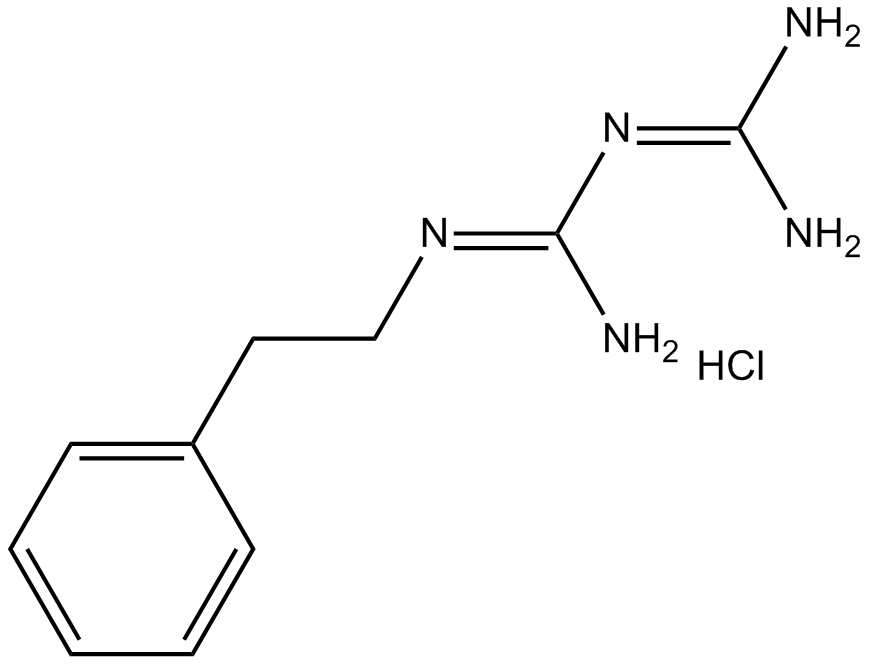Phenformin HCl |
| Catalog No.GC10461 |
Phenformin HCl is an anti-diabetic drug from the biguanide class, can activate AMPK activity.
Products are for research use only. Not for human use. We do not sell to patients.

Cas No.: 834-28-6
Sample solution is provided at 25 µL, 10mM.
Phenformin hydrochloride is an anti-diabetic drug from the biguanide class, can activate AMPK activity.
Phenformin stimulates the phosphorylation and activation of AMPKalpha1 and AMPKalpha2 without altering LKB1 activity[1]. Phenformin increases AMPK activity and phosphorylation in the isolated heart, the increase in AMPK activity is always preceded by and correlated with increased cytosolic [AMP][2]. Phenformin is a 50-fold more potent inhibitor of mitochondrial complex I than metformin. Phenformin robustly induces apoptosis in LKB1 deficient NSCLC cell lines. Phenformin at 2 mM similarly induces AMPK signaling as shown by increased P-AMPK and P-Raptor levels. Phenformin induces higher levels of cellular stress, triggering induction of P-Ser51 eIF2α and its downstream target CHOP, and markers of apoptosis at later times. Phenformin induces a significant increase in survival and therapeutic response in KLluc mice following long-term treatment[3]. Phenformin and AICAR increases AMPK activity in H441 cells in a dose-dependent fashion, stimulating the kinase maximally at 5-10 mm and 2 mm, respectively. Phenformin significantly decreases basal ion transport (measured as short circuit current) across H441 monolayers by approximately 50% compared with that of controls. Phenformin and AICAR significantly reduce amiloride-sensitive transepithelial Na+ transport compared with controls. Phenformin and AICAR suppress amiloride-sensitive Na+ transport across H441 cells via a pathway that includes activation of AMPK and inhibition of both apical Na+ entry through ENaC and basolateral Na+ extrusion via the Na+,K+-ATPase[4]. Phenformin-treated rats reveals a tendency towards a decrease in blood insulin level (radioimmunoassay)[5].
Phenformin increases levels of P-eIF2α and its target BiP/Grp78 in normal lung as well as in lung tumors of mice[3].
References:
[1]. Sakamoto K, et al. Activity of LKB1 and AMPK-related kinases in skeletal muscle: effects of contraction, phenformin, and AICAR. Am J Physiol Endocrinol Metab. 2004 Aug;287(2):E310-7.
[2]. Zhang L, et al. Metformin and phenformin activate AMP-activated protein kinase in the heart by increasing cytosolic AMP concentration. Am J Physiol Heart Circ Physiol. 2007 Jul;293(1):H457-66.
[3]. Moreira AL, et al. Thalidomide exerts its inhibitory action on tumor necrosis factor alpha by enhancing mRNA degradation. J Exp Med. 1993 Jun 1;177(6):1675-80.
[4]. Woollhead AM, et al. Phenformin and 5-aminoimidazole-4-carboxamide-1-beta-D-ribofuranoside (AICAR) activation of AMP-activated protein kinase inhibits transepithelial Na+ transport across H441 lung cells. J Physiol. 2005 Aug 1;566(Pt 3):781-92. Epub 2005
[5]. Dilman VM, et al. Inhibition of DMBA-induced carcinogenesis by phenformin in the mammary gland of rats. Arch Geschwulstforsch. 1978;48(1):1-8.
Average Rating: 5 (Based on Reviews and 3 reference(s) in Google Scholar.)
GLPBIO products are for RESEARCH USE ONLY. Please make sure your review or question is research based.
Required fields are marked with *




















